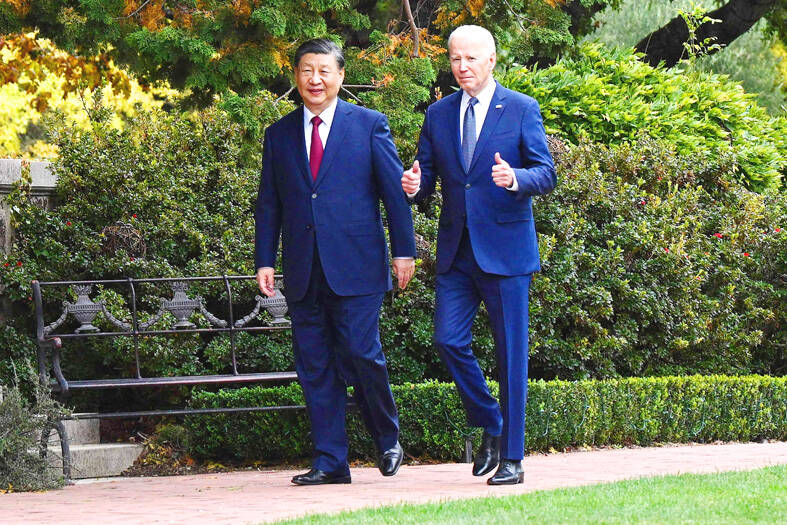US President Joe Biden’s teleconference with Chinese President Xi Jinping (習近平) this week was part of a crisis management strategy and should not be taken as a sign of easing tensions, an academic said yesterday.
The timing of the call on Tuesday US time was not a coincidence, as it took place while American Institute in Taiwan Chair Laura Rosenberger was visiting Taiwan, said Kuo Yu-jen (郭育仁), a professor at the Institute of China and Asia-Pacific Studies at National Sun Yat-sen University.
Biden and Xi “held a candid and constructive discussion on a range of bilateral, regional and global issues, including areas of cooperation and areas of difference,” the White House said in a statement.

Photo: AFP
“President Biden emphasized the importance of maintaining peace and stability across the Taiwan Strait and the rule of law and freedom of navigation in the South China Sea,” it added.
The two leaders’ call and their in-person meeting at APEC in November last year suggest that risk management has become the new paradigm in the bilateral relationship, Kuo said.
The continued conversations between the two leaders indicate Beijing’s acceptance of the US-proposed “guardrails” to de-risk a volatile situation, not movement toward reconciliation, he said.
The reason for Xi’s willingness to engage in cooperation is the unfavorable turn of geopolitics and a surge in uncertainty beginning in the latter half of last year, Kuo said.
Escalation in the Israel-Hamas war, Russia’s interjection into the standoff in the Korean Peninsula, China-Philippines confrontations in the South China Sea and former US president Donald Trump’s resurgence are among the factors that encouraged the two sides to manage risks together, he said.
Managing the potential for conflict in the Taiwan Strait is a key part of the two sides’ strategy of derisking, Kuo said.
Biden’s approach has been a double strategy to restrain Taiwan from provoking Beijing while warning China that there would be consequences for rash actions, he said.
The US model of managing the Taiwan Strait can be seen in action following Vice President William Lai’s (賴清德) election victory, as Washington reiterated its opposition to Taiwanese independence, while Beijing refrained from taking overly dramatic action, he said.
This explains Biden’s decision to use the hotline to call China and send Rosenberger to Taiwan at the same time, Kuo added.
This is not the only time Biden arranged a China interaction at the same time as a friendly gesture to Taiwan, he said.
Biden called Xi for the first time on Feb. 10, 2021, the day then-representative to the US Hsiao Bi-khim (蕭美琴) met with Sung Kim, then-acting US assistant secretary of state for East Asian and Pacific affairs, Kuo said.
Similarly, US Secretary of State Antony Blinken openly accused China of giving arms to aid Russia’s invasion of Ukraine right before Biden’s talk with Xi on March 18, 2022, he said.
The two leaders spoke again in July that year, a month before then-US House of Representatives speaker Nancy Pelosi visited Taiwan, he said.

Actor Darren Wang (王大陸) was questioned by prosecutors for allegedly orchestrating an attack on a taxi driver after he was allegedly driven on a longer than necessary route in a car he disliked. The questioning at the New Taipei City District Prosecutors’ Office was ongoing as of press time last night. Police have recommended charges of attempted murder. The legally embattled actor — known for his role in the coming-of-age film Our Times (我的少女時代) — is under a separate investigation for allegedly using fake medical documents to evade mandatory military service. According to local media reports, police said Wang earlier last year ordered a

CAUTION: Based on intelligence from the nation’s security agencies, MOFA has cautioned Taiwanese travelers about heightened safety risks in China-friendly countries The Ministry of Foreign Affairs (MOFA) yesterday urged Taiwanese to be aware of their safety when traveling abroad, especially in countries that are friendly to China. China in June last year issued 22 guidelines that allow its courts to try in absentia and sentence to death so-called “diehard” Taiwanese independence activists, even though Chinese courts have no jurisdiction in Taiwan. Late last month, a senior Chinese official gave closed-door instructions to state security units to implement the guidelines in countries friendly to China, a government memo and a senior Taiwan security official said, based on information gathered by Taiwan’s intelligence agency. The

Taiwan Semiconductor Manufacturing Co (TSMC), the world’s largest contract chipmaker, said yesterday that it is looking to hire 8,000 people this year, at a time when the tech giant is expanding production capacity to maintain its lead over competitors. To attract talent, TSMC would launch a large-scale recruitment campaign on campuses across Taiwan, where a newly recruited engineer with a master’s degree could expect to receive an average salary of NT$2.2 million (US$60,912), which is much higher than the 2023 national average of NT$709,000 for those in the same category, according to government statistics. TSMC, which accounted for more than 60 percent

President William Lai (賴清德) should protect Taiwan Semiconductor Manufacturing Co (TSMC), and stop supporting domestic strife and discord, former president Ma Ying-jeou (馬英九) wrote on Facebook yesterday. US President Donald Trump and TSMC on Monday jointly announced that the company would invest an additional US$100 billion over the next few years to expand its semiconductor manufacturing operations in the US. The TSMC plans have promoted concern in Taiwan that it would effectively lead to the chipmaking giant becoming Americanized. The Lai administration lacks tangible policies to address concerns that Taiwan might follow in Ukraine’s footsteps, Ma wrote. Instead, it seems to think it could